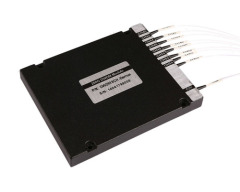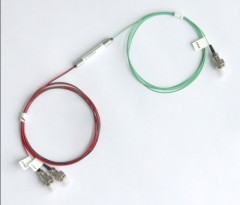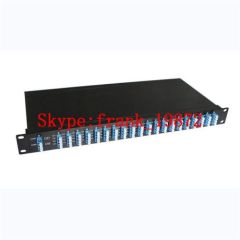
|
Flyin Optronics Co., Ltd (shenzhen)
|
41ch 100G Athermal AWG(41ch 100G AAWG)
| Price: | 25.0~400.0 USD |
| Payment Terms: | T/T |
| Place of Origin: | Guangdong, China (Mainland) |
|
|
|
| Add to My Favorites | |
| HiSupplier Escrow |
Product Detail
Wide Operating Wavelength Range
Low Insertion Loss
Ultra Flat Wide Passband
High Channel Isolation
High Stability and reliab
Flyin Optronics offers a full range of Thermal/Athermal AWG products, including 50GHz, 100GHz and 200GHz Thermal/Athermal AWG. Here we present the generic specification for the 41-channel 100GHz Gaussian Athermal AWG (41 channel AAWG) MUX/DEMUX component supplied for use in DWDM system.
Athermal AWG(AAWG) have equivalent performance to standard Thermal AWG(TAWG) but require no electrical power for stabilization. They can be used as direct replacements for Thin Film Filters(Filter type DWDM module) for cases where no power is available, also suitable for outdoor applications over -30 to +70 degree in access networks. Flyin's Athermal AWG(AAWG) provide excellent optical performance, high reliability, ease of fiber handling and power saving solution in a compact package. Different input and output fibers, such as SM fibers, MM fibers and PM fiber can be selected to meet different applications. We can also offer different product packages, inluding special metal box and 19" 1U rackmount.
The planar DWDM components(Thermal/Athermal AWG) from Flyin Optronics are fully qualified according to Telcordia reliability assurance requirements for fiber optic and opto-electronic components (GR-1221-CORE/UNC, Generic Reliability Assurance Requirements for Fiber Optic Branching Components, and Telcordia TR-NWT-000468, Reliability Assurance Practices for Opto-electronic Devices).
Optical Specification (Gaussian Athermal AWG)
Parameters | Condition | Specs | Units | ||
Min | Typ | Max | |||
Number of Channels | 41 | ||||
Number Channel Spacing | 100GHz | 100 | GHz | ||
Cha. Center Wavelength | ITU frequency. | C -band | nm | ||
Clear Channel Passband | ±12.5 | GHz | |||
Wavelength Stability | Maximum range of the wavelength error of all channels and temperatures in average polarization. | ±0.05 | nm | ||
-1 dB Channel Bandwidth | Clear channel bandwidth defined by passband shape. For each channel | 0.24 | nm | ||
-3 dB Channel Bandwidth | Clear channel bandwidth defined by passband shape. For each channel | 0.43 | nm | ||
Optical Insertion Loss at ITU grid | Defined as the minimum transmission at ITU wavelength for all channels. For each channel, at all temperatures and polarizations. | 4.5 | 6.0 | dB | |
Adjacent Channel Isolation | Insertion loss difference from the mean transmission at the ITU grid wavelength to the highest power, all polarizations, within the ITU band of the adjacent channels. | 25 | dB | ||
Non-Adjacent, Channel Isolation | Insertion loss difference from the mean transmission at the ITU grid wavelength to the highest power, all polarizations, within the ITU band of the nonadjacent channels. | 29 | dB | ||
Total Channel Isolation | Total cumulative insertion loss difference from the mean transmission at the ITU grid wavelength to the highest power, all polarizations, within the ITU band of all other channels, including adjacent channels. | 22 | dB | ||
Insertion Loss Uniformity | Maximum range of the insertion loss variation within ITU across all channels, polarizations and temperatures. | 1.5 | dB | ||
Directivity(Mux Only) | Ratio of reflected power out of any channel(other than channel n)to power in from the input channel n | 40 | dB | ||
Insertion Loss Ripple | Any maxima and any minima of optical loss across ITU band, excluding boundary points, for each channel at each port | 1.2 | dB | ||
Optical Return loss | Input & output ports | 40 | dB | ||
PDL/Polarization Dependent Loss in Clear Channel Band | Worst-case value measured in ITU band | 0.3 | 0.5 | dB | |
Polarization Mode Dispersion | 0.5 | ps | |||
Maximum Optical Power | 23 | dBm | |||
MUX/DEMUX input/ output Monitoring range | -35 | +23 | dBm | ||
IL Represents the worst case over a +/-0.01nm window around the ITU wavelength;
PDL was measured on average polarization over a +/- 0.01nm window around the ITU wavelength.









